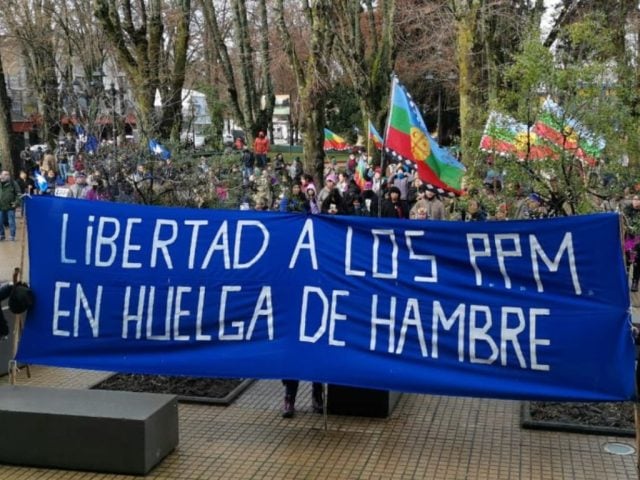Original article: Presos políticos mapuche de Angol bajan huelga de hambre tras 105 días
On October 16, representatives from Module E of the Angol prison confirmed to El Ciudadano that the Mapuche political prisoners have ended their hunger strike after 105 days following «agreements with Gendarmería.» This decision comes after, on the 103rd day, part of the group announced they would shift to a dry hunger strike due to «breach of previous commitments» and the «indifference of the authorities.»
Hunger Strike in Angol: Context of the Dry Hunger Strike and Health Deterioration
Earlier this week, a public statement from Module E revealed that Antonio Lebu Neculpan, who has been on liquid fasting since September 17, “has decided to change his hunger strike to a dry hunger strike,” and that Estefani Pérez Ancalaf, “who has been on liquid hunger strike for over 100 days, has also decided to shift to a dry strike.” The same document reported the physical condition of several communal leaders and severe weight losses (for instance: Antonio Lebu Neculpan: 80 kg → 70.5 kg; Kevin Rubilar Quiñimil: 72 kg → 62.3 kg; Juan Queipul Quidel: 83 kg → 72.1 kg).
Demands: Intercultural Healthcare, Agreement Compliance, and Due Process
The repeated demands put forth by the communal leaders include: immediate transfer of the hunger strikers to the Intercultural Hospital of Nueva Imperial with the support of a machi and intercultural health teams; effective compliance with agreements made by Gendarmería and the State in prior hunger strikes; unwavering respect for ILO Convention 169 and Decree 518 (Internal Regulations of Gendarmería) regarding culture, traditions, and health practices; and guarantees of fair trial for José Arzola Millalén and Dagoberto Queipul.
Why It Escalated: “Over 10 Previous Strikes” and International Standards
The early week statement accused the recurrence of fasts—“over 10 hunger strikes”—as a means to demand rights already recognized by law and treaties. The ILO Convention 169 (cultural identity, traditional medicine, and customs) and Decree 518 (respect for culture and lifestyle within penitentiary facilities) were invoked, denouncing that Gendarmería “refuses to comply with both mandates” by “systematically denying the right to intercultural medical care.”
With the end of the hunger strike on October 16, focus now shifts to the clinical monitoring of the prisoners, the effective implementation of the requested intercultural care, and the compliance with agreements made in prior discussions. Representatives from Module E emphasize that this case tests the penitentiary interculturality and the practical validity of the international standards ratified by the State of Chile.

